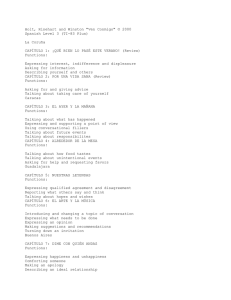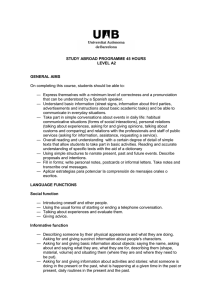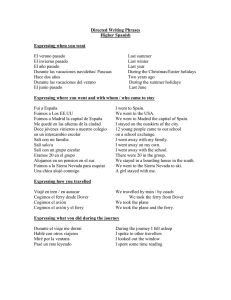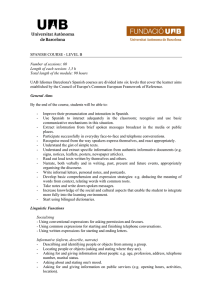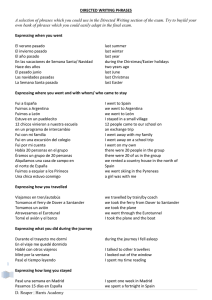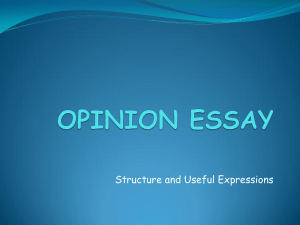Competencia pragmática en textos 126 Apéndice 1: Actos de habla
Anuncio
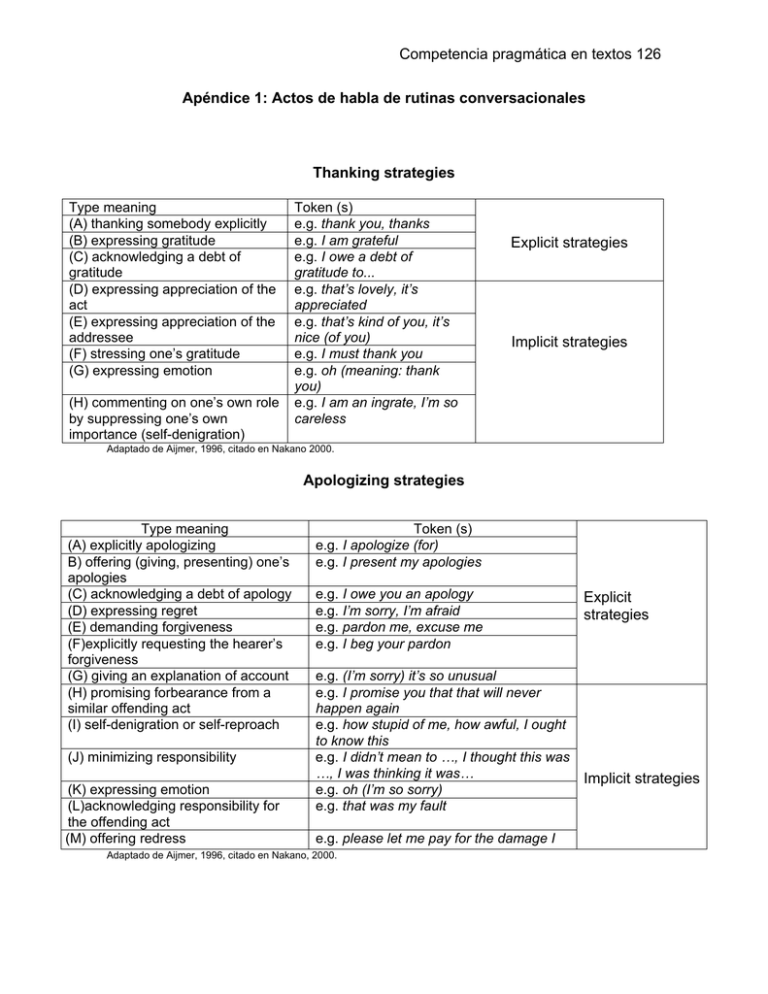
Competencia pragmática en textos 126 Apéndice 1: Actos de habla de rutinas conversacionales Thanking strategies Type meaning (A) thanking somebody explicitly (B) expressing gratitude (C) acknowledging a debt of gratitude (D) expressing appreciation of the act (E) expressing appreciation of the addressee (F) stressing one’s gratitude (G) expressing emotion (H) commenting on one’s own role by suppressing one’s own importance (self-denigration) Token (s) e.g. thank you, thanks e.g. I am grateful e.g. I owe a debt of gratitude to... e.g. that’s lovely, it’s appreciated e.g. that’s kind of you, it’s nice (of you) e.g. I must thank you e.g. oh (meaning: thank you) e.g. I am an ingrate, I’m so careless Explicit strategies Implicit strategies Adaptado de Aijmer, 1996, citado en Nakano 2000. Apologizing strategies Type meaning (A) explicitly apologizing B) offering (giving, presenting) one’s apologies (C) acknowledging a debt of apology (D) expressing regret (E) demanding forgiveness (F)explicitly requesting the hearer’s forgiveness (G) giving an explanation of account (H) promising forbearance from a similar offending act (I) self-denigration or self-reproach (J) minimizing responsibility (K) expressing emotion (L)acknowledging responsibility for the offending act (M) offering redress Token (s) e.g. I apologize (for) e.g. I present my apologies e.g. I owe you an apology e.g. I’m sorry, I’m afraid e.g. pardon me, excuse me e.g. I beg your pardon e.g. (I’m sorry) it’s so unusual e.g. I promise you that that will never happen again e.g. how stupid of me, how awful, I ought to know this e.g. I didn’t mean to …, I thought this was …, I was thinking it was… e.g. oh (I’m so sorry) e.g. that was my fault e.g. please let me pay for the damage I Adaptado de Aijmer, 1996, citado en Nakano, 2000. Explicit strategies Implicit strategies Competencia pragmática en textos 127 Requesting & Offering Strategies Type meaning (A) Ability: Asking about the hearer’s ability to do something (B) Consultation: Asking about the possibility of the desired act happening (C) Willingness: Asking whether the hearer is willing to do something or has any objection to doing something (D) Want: Expressing a wish that the agent should do something (E) Need: Expressing a need or desire from (non-verbal) goods (F) Obligation: Stating that the hearer is under the obligation to do the desired action (G) Apropriacy: Stating that it is appropriate that the hearer performs the desired action (H) WH- Question: Asking an idiomatic whquestion (I) Hypothesis: Referring to a hypothetical action (J) Appreciation: Expressing that one would appreciate, be pleased, feel gratitude (K) Permission Question: Asking for permission to do something (L) Possibility: Asserting that it is possible for the hearer to do something (M) Preference: Referring to the speaker’s opinion that something is preferable (N) Performative: Referring explicitly to the act of requesting (O) State: Referring to a state in the world which needs to be changed (P) Naming: Naming the object requested (Q) Existence: Checking the availability of the desired object, etc (R) Others: Giving a justification for a request Adaptado de Aijmer, 1996, citado en Nakano, 2000. Token (s) e.g. Can you… e.g. (e.g.) Is it possible…, you haven’t got…, would you mind…, have you… e.g. (e.g.) will you…, would you (like)… e.g. I would like you to… e.g. I want…, I need… e.g. You must…, You have to… e.g. You should… e.g. What about…, Why not…, How about…, why don’t you… e.g. You would…, perhaps you would… e.g. I would be grateful if you would…, I would be glad if… e.g. may I…, let me… e.g. You may…, you can… e.g. You had better…, the best thing to do… e.g. I was going to suggest… e.g. There are (some scented rushes)… e.g. (the next slide) please e.g. is (Mrs. Davis) there… e.g.
